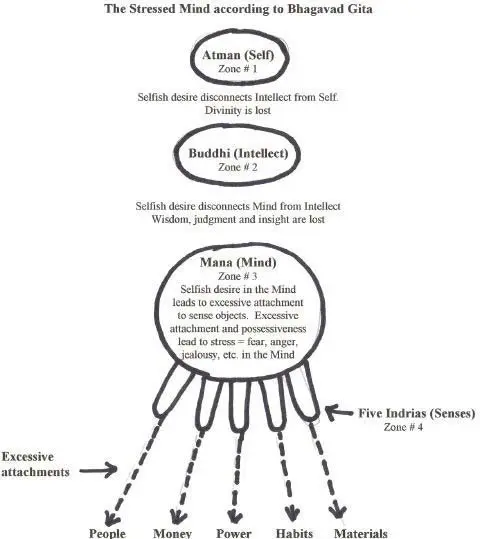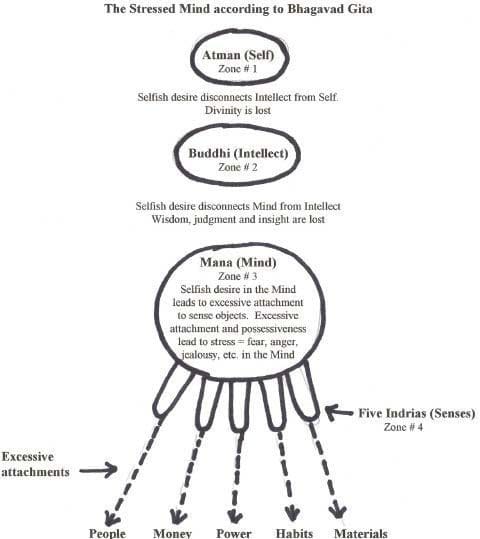
Bhagavad Gita is like a 700 piece jigsaw puzzle without its original box. You don’t know what the puzzle is supposed to look like. Many pieces look alike and many appear very complex. You don’t know where to begin. There is one jigsaw piece, however, that is the key to understanding Bhagavad Gita and that is Gita: 3:42.
Once you understand this piece thoroughly, the whole of Bhagavad Gita becomes a piece of Mithai laddoo. The model I am presenting below is the same model except that you are now looking at it from the front, like looking at a Christmas tree.

Conflict with others is a major source of stress in our daily life – Bhagavad Gita
Every conflict between two people has to do with one side wanting to possess what the other side has, or to control it. This results in one side wanting to impose its will, view, opinion, or belief on the other. We see this in every conflict in the world: between husband and wife; between parents and children; between in-laws; between friends; between boss and employee; between business partners; between communities, and even between nations.
Evil behavior from one side or both follows. So Arjuna asks Lord Krishna
Bhagavad Gita 3:36: “What is it that drives a man to commit evil, Varshneya, however reluctantly, as though propelled by force?”
Lord Krishna reply is powerful
Bhagavad Gita: 3: 37-39: “It is selfish Desire (kama), it is anger (krodha), which springs from the force of passion (Rajas guNa, one of three guNas which we will study later) the great devourer, the great evil; know that this is the enemy here. Just as the fire is covered by smoke and mirror is obscured by dust, just as embryo is covered by amniotic membrane, Knowledge (Intellect) becomes covered by this selfish Desire- hidden, Arjuna, by this unquenchable fire for self gratification, the inveterate enemy of the wise.”
Wow!
Here Lord Krishna is not referring to our plain human desire to live, love, be loved, eat, sleep, clothe and have fun.
The kind of selfish desire he is referring to is like the blind ambition Duryodhana had.
Let us see if we can relate these to examples of excessive attachment to sense objects in our daily lives.
Excessive attachment to people:
A mother (who reads the Bhagavad Gita every day) excessively attached to, and possessive of, her son creates tension between her son and daughter-in-law. She does her best to prevent her son from spending any time with his wife. Her controlling behavior drives a wedge between him and his wife.
The son (who knows Bhagavad Gita by heart) being excessively attached to his mother is gutless in standing up to his mother for fear of losing her affection. His dharma jnana (what is right and what is wrong) becomes clouded by his possessive love for his mother. He silently watches his wife being mercilessly tortured by his mother.
Likewise, a person possessively attached to a friend becomes jealous and angry when his/her friend associates with another person.
The tragic consequences of excessive attachment can be seen everywhere in Mahabharata: Bheeshma’s excessive attachment to his father, Shantanu; Shanthanu’s amorous attachment to Satyavati; Dhritharastra’s sick attachment to Duryodhana, etc.
Cultivating an attitude of “Let go and let God” changes everything for the better.
Excessive attachment to money leads to Money Disease.
In this malady, a person is obsessed with making and accumulating money even when he does not spend it usefully. It is as useless or dangerous as excess fat in the body. His every thought, every utterance, every behavior, every action, every human contact, every friendship, membership of every “service organization” is geared toward the ulterior motive of making money by hook or by crook.
He misses no opportunity to use people to profit from them. Every one of these people lives a miserable life as he never knows the pleasure of giving, of contentment, or of peace of mind. His obsession with money kills his dharmajnana, humanity or divinity.
You must read Bhagavad Gita 16:12-18 at this point: The corrupt bureaucrats and politicians and some businessmen you meet in India are classic examples of these people. Inevitably, greed leads to fraud, and fraud leads to financial, legal, and family problems. Unfortunately, their children and grandchildren end up suffering from their karmaphala.
Unlimited availability of illicit money leads to bad habits and self-destructive behavior. Cultivating an attitude of “contentment, fairness, generosity, charity” etc. (Bhagavad Gita: 16: 1-3) will liberate this person from the bondage of money disease.
Excessive attachment to power, position, title, etc.
This leads to dirty politics and power struggle we see in every organization, be it a political party, temple committee, or cultural association. People with this affliction simply keep hankering for power, position, title, status, etc (My status is higher than his). They hang on to it until they get kicked out unceremoniously by someone more powerful than him.
Apparently, they have never heard Kenny Roger’s song “You’ve got to know when to hold it, know when to fold it, know when to walk away and know when to run…..! An attitude of “selfless service” (Nishkama karma) liberates on from this whirlpool of misery. Bhagavad Gita: 2: 47-51. 5: 10.
Excessive attachment to food, sex, drugs, alcohol, sex, gambling
Stressed-out people use these as a way to calm themselves down. Overeating leads to obesity, heart disease, diabetes, arthritis. Drinking excessively leads to alcoholism, liver, stomach, and heart disease. Likewise, gambling, taking drugs, illicit sex, etc. have serious long-term consequences. Financial, legal health, and family problems follow as day follows night.
Cultivating an attitude of “moderation in everything” and regulating one’s daily habits (Bhagavad Gita: 6: 16, 17).
Excessive attachment to material things (Gita: 5: 22) such as house, cars, gold, jewelry, gadgets, etc.
These could lead to severe stress for fear of one day not having these, or for fear of others having more of these. Pathological jealousy is common. More often than not people use these things as a way of promoting their image in others’ eyes (“prestige issue”) rather than for any true self-enjoyment. These people begin to define their lives by what others think of them, not what they think of themselves.
The affliction of “comparing and competing” (C & C disease) is a major source of stress among Indians today. One can cultivate an attitude of enjoying material comforts in a detached manner (Bhagavad Gita: 5: 8,9). Cultivating a simple attitude such as “I am happy for him that he has all these things and that these things make him happy!” would liberate one from the misery of jealousy.
Another liberating attitude is “What anybody thinks about me or my financial situation makes no difference to me.”


😀
Thank you for posting